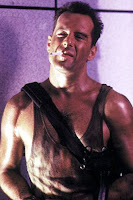
We can’t help it; it’s become ingrained in all of us. We hear the first few bars of Beethoven’s Ode to Joy or hear some rambunctious cowboy-type spout “yippee ki yay,” and our thoughts immediately turn to Die Hard.
John McClane embarks on his fifth (mis)adventure this week in John Moore’s A Good Day to Die Hard. This time around, John is in Russia and ends up inadvertently teaming with his son Jack to stop a nuclear weapon from falling into the hands of some very unsavory characters.
What is it about this series and this character that hasallowed him to remain alive and well in the imaginations of audiences 25 years after the first film? To understand the longevity of this franchise, it is important to not only to analyze the appeal of the first film, but also to understand how its defining characteristics have been stretched, altered, and redefined.
Ordinary Guy Extraordinary Situation
Cary Grant and Jimmy Stewart were Alfred Hitchcock’s go-to leads for many years. Why? Because they embodied his prototypical hero; the ordinary man in the extraordinary situation.
Bruce Willis as John McClane is simply the action movie iteration of that same character. While he too is the wrong man in the wrong place at the wrong time, contemporary audiences connect with him because he is not as passive or out of his element as Hitch’s heroes. His law enforcement training casts him in a natural protector role that compels him to forge headlong into trouble. This has been a threadline through all four existing movies.
RELATED: Naughty or Nice: 'Die Hard' Vs. 'Reindeer Games
It’s ironic that the new film is called A Good Day to Die Hard, given that John McClane hasn’t had a good day in quite some time. The guy has terrible luck, and though it may seem absurd how often these things keep happening to him, on some level, we relate to his seeming inability to catch a break. Additionally, what we like about John is that, again pursuant to his status as a regular guy, he gets hurt in the line of duty. And this is not the single flesh wound of most action heroes. By the end of all the Die Hard films, McClane is bruised and bleeding profusely. By the closing credits of Die Hard with a Vengeance, for instance, McClane looks like the lone survivor of a horror film.
Even Live Free or Die Hard, which is the most widely reviled sequel, saw McClane physically decimated by the end. The problem however is that Live Free or Die Hard pushed the envelope as to what McClane was able to survive, bloodied or otherwise. All of a sudden, he could surf fighter jets and walk away from fifty-foot plummets onto concrete overpasses. He also began inexplicably throwing cars at helicopters. Die Hard 2, arguably the second weakest entry, may have involved a few overzealous stunts, and the fall from the cable onto the cargo ship in Die Hard with a Vengeance may have been a bit over-the-top, but there is only so much disbelief we can be required to suspend with this character.
So Funny It Hurts
One of the things we have loved about these movies from day one is John McClane’s wry sense of humor. Even when he is in dire situations, he still manages to trade insulting jabs with the bad guys. McClaine is also unsure of his own means. He would often be heard quipping, “this is a bad idea,” whenever attempting some makeshift explosive or leap into a dangerous situation with barely a look beforehand. It was a subtle note of self-effacing humility that has underscored each and every entry.
RELATED: 'A Good Day to Die Hard': Bruce Willis Is Not the Hugging-Type — Trailer
This emphasis on comedy to lend personality has also been evident in the franchise’s supporting cast. Though also providing some of the film’s most heartfelt interaction, Die Hard’s Sgt. Al Powell provided a wonderful comic complement to Willis’ otherwise solitary hero. Reginald VelJohnson’s outside-looking-in beat cop didn’t even enter the Nakatomi tower, but he is regardless an indelible part of this series. Powell was brought back for a cameo in Die Hard 2. Furthering that trait, to a rather diminished effect, McClane was aided by a janitor named Marvin later in Die Hard 2.
It was in Die Hard with a Vengeance that this concept was extrapolated into the creation of an actual sidekick who accompanied McClane through the whole movie. Samuel L. Jackson played off Willis so well that the franchise skirted what could have been a tumble into the generic buddy cop film rut. This trend would also explain Justin Long’s presence in Live Free or Die Hard, though his spastic hacker sidekick was a poor complement to McClane and only served to emphasize the fact that the villains went from formidable terrorists/thieves to jumped-up Best Buy employees. Hopefully John’s own son will offer a fitting counterbalance to his antics in A Good Day to Die Hard. Next: Opening Up the World of Die Hard… for Better or Worse

No comments:
Post a Comment